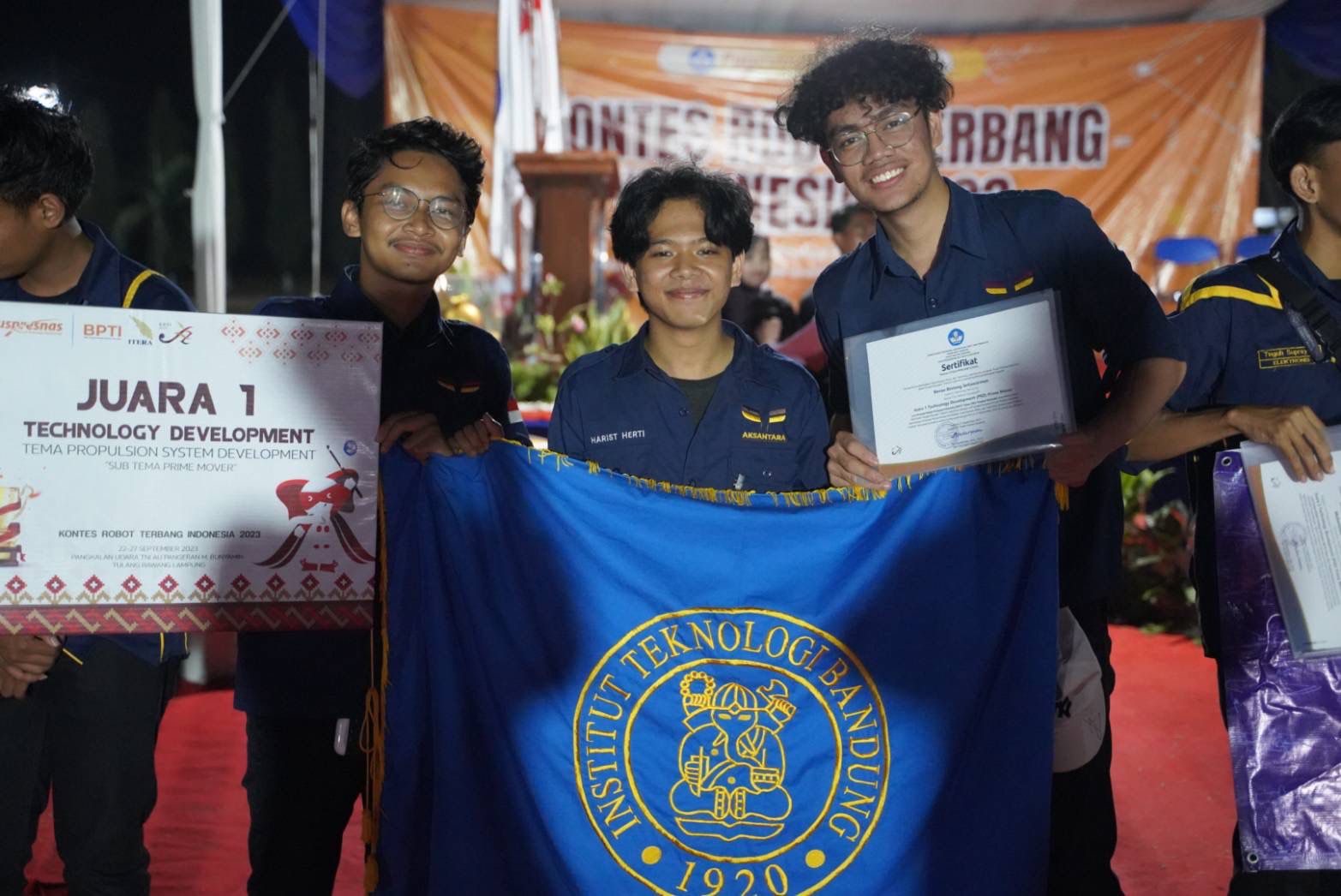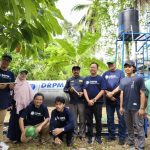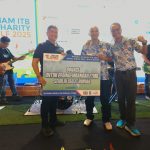Brilliant Achievements of the ITB Aksantara Team in the 2023 Indonesian Flying Robot Contest
Bandung – The Indonesia Flying Robot Competition (KRTI) in 2023, organized by the National Achievement Center of the Ministry of Education and Culture (PUSPRESNAS) from September 22 to 27, stands as the most prestigious unmanned aircraft competition in Indonesia, open to all universities across the nation. This year, the honor of hosting this event goes to the Institut Teknologi Sumatera. The final assessment for KRTI will take place at the Air Force Base of TNI AU Pangeran M. Bun Yamin in Lampung.
ITB (Institut Teknologi Bandung) sent its representatives through the student activity unit Aksantara ITB. The competition categories in which they participated included Flight Controller, Propulsion System, Propeller, Ground Control System, Prime Mover, Airframe, and Electronic Speed Control.
Aksantara ITB has dispatched several teams, one notable among them being Team Altigen Krasnala, under the guidance of Dr. Widyawardana Adiprawita, ST., M.T. The team comprises members such as Lilo Handaru Jati (Mechanical Engineering), Marcellus Mario Lukman (Aerospace Engineering), Bimar Dwi Anggoro (Mechanical Engineering), and Sulthan Raihan Falah Sugiharto (Mechanical Engineering), alongside other team members. They achieved the esteemed first position in the Vertical Take Off Landing category and were also awarded for Best Strategy in Vertical Take Off Landing.
Under the guidance of Rianto Adhy Sasongko, ST., M.Sc., Ph.D., Team Aakesh Ganapatih, comprised of members such as Bevan Bintang Setiawarman (Aerospace Engineering), Dhafin Anshar Prisetya (Aerospace Engineering), Muhammad Harist Herti, and Ramadhani (Material Engineering), alongside other team members, secured the coveted first place in the Technology Development Prime Mover category.
In the Prime Mover category, participants were tasked with developing the primary propulsion system for aerial vehicles. Despite the formidable challenge and a limited timeframe of one and a half months, the team triumphed in this thematic pursuit. This success was not without its challenges, as their initial plan did not align with the specified theme, necessitating a swift adaptation of their technological approach.
“Do not rush into the manufacturing trial phase; the idea must be thoroughly refined first.” This advice was given by one of the members of the Technology Development Prime Mover team to contestants preparing for the upcoming KRTI.
Under the guidance of Dr. Firman Hartono, S.T., M.T., Team Akasha Wiyasa, comprised of members such as Jessica Athalia Moelia Sapoetra (Mechanical Engineering), Dandy Arif Rahmadi (Physics Engineering), Alfiedo Aryaputra Pongrante (Mechanical Engineering), and other team members, achieved a commendable second place in the Technology Development Propeller category.
The Propeller team has disclosed the challenges encountered during the development of their idea. The ideation refinement process is still underway from the regional to the national selection levels. One of the primary obstacles faced is the constraint of time, particularly during the demonstration phase when the team conducts flight tests. Additionally, they have encountered difficulties in sourcing raw materials, sometimes realizing these needs only after the initiation of the process. Looking ahead, the team expresses the hope that next year’s preparation timeline will be more extended to ensure a more thorough preparation process.
Under the guidance of Ahmad Izzudin, S.T., M.T., Team Catra Danadyaksa, consisting of members such as Sigit Adriansyah (Mechanical Engineering), George Daniel Nugroho (Electrical Engineering), Rafa Nanda Akilah (Astronomy), and other team members, achieved a notable second position in the Technology Development Ground Control Station category.
The GCS team itself encountered several challenges in their development process. Their primary challenge lay in the shortage of human resources, particularly for the critical aspect of GCS development within the project. Difficulties also arose concerning team education and project testing, especially during flight trials. Nevertheless, Team Catra Danadyaksa managed to overcome a significant portion of these challenges with assistance from the project manager and by adapting their development strategy. While the team initially aspired to control multiple drones, they ultimately shifted their focus to controlling a single drone with unique features such as precision landing and video monitoring.
Under the guidance of Dr. Yazdi Ibrahim Jenie, S.T., M.T., Team Atasya Bramantya, consisting of members such as Djoko Bayu Murtie (Aerospace Engineering), Alif Addamaghany Kurniawan (Mechanical Engineering), Nadhifa Tsaniyah Adira (Mechanical Engineering), and other team members, secured a notable second place in the Technology Development Airframe category.
Simultaneously, Team Ayaskara Nawang, under the mentorship of Anggera Bayuwindra, S.T., M.T., Ph.D., with members including Muhammad Mumtaz (Information Systems and Technology), Fathiya Amani Shabira (Electrical Engineering), Sinekar Lintang (Electrical Engineering), and other team members, achieved the distinguished second position in the Technology Flight Controller Development category.
Team Ayaskara Nawang strategically focused their development efforts on flight control technology, particularly in the domain of flight controllers. They sought exemplary talent from the STAY team and collaborated with electrical engineering students for hardware design. In the realm of software development, they harnessed the combined expertise of both STAY and FTMD students, particularly those specializing in aerospace engineering, for calculations and coding. The team successfully produced two types of flight controllers during the final competition, one utilizing STM32F4 and the other STM32F7, each known for its enhanced processing speed.
The Ayaskara Nawang team faced a significant challenge in their inability to implement hybrid UAV system experiments, a capability possessed by their top competitors. This limitation may stem from a lack of experience in hybrid UAV system development.
Despite the hurdles encountered by the Ayaskara Nawang team, they managed to clinch victory in six out of seven competitions they participated in. This triumph underscores the technological prowess and creative ingenuity of ITB students in the unmanned aerial vehicle (UAV) technology realm.
Translated by Vanela Kusuma Amalia







